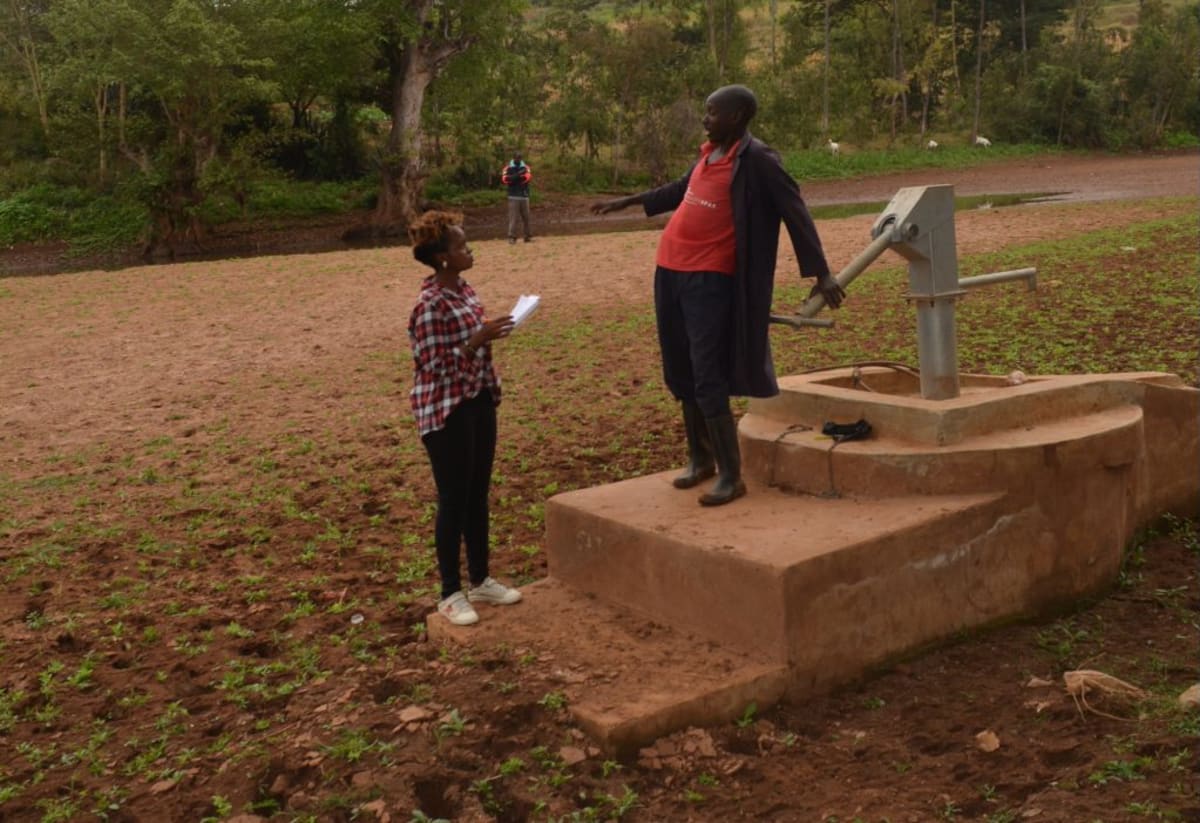This project is a part of our shared program with Africa Sand Dam Foundation. Our team is pleased to directly share the below report (edited for clarity, as needed).
Welcome to the Community
The Masola Kaani Self-Help Group was formed in the year 2011 and is now comprised of 47 households. The main reason for forming the group was to bolster the economic prosperity of its members. These families live in one of the most densely populated areas of Makueni, which has a total population of 3000 people. (Editor’s Note: While this many people may have access on any given day, realistically a single water source can only support a population of 350-500 people. This site will make a great location for a second project. To learn more, click here.) Originally, the area was famous for its massive production of vegetables, thanks to the River Ikiwe that could provide enough water for many crops. The group’s priority was to increase the harvest of vegetables so they could sell more and earn more. However, in the last three years, drastic changes have happened.
Their main source of water, River Ikiwe, has eroded and no longer provides water throughout the year. This has affected the availability of water for farming, for domestic use and other household water requirements. Many of the people that had been employed on vegetable farms have now been rendered jobless, and many families struggle to meet their daily income needs. Longer queues at the water points and higher prices for buying drinking water have become normal experiences. A jerrycan of water (20 liters) costs 30 shillings during the dry season; a price which many households cannot afford. By coming together, the group hopes to harvest rainwater through construction of several sand dams along the river channel. These will be used to provide water for all their household and agricultural needs, and restore the jobs that were lost.
The community was selected after several meetings with an ASDF officer. The meetings were meant to analyze the major problems the group faces, and what measures to put in place to solve those identified problems. The main problem that came up was water; people need much more water for household and farming purposes. We have decided to support the Masola Kaani Self-Help Group for a period of five years during which we will identify what type and how many more projects we will undertake together.
Water Situation
Locals prefer to get their water from the river by digging scoop holes along the eroded bank until they hit water. Water is only found two to three months after the rainy season, though. Women will take ox-pulled carts or donkeys to help them carry multiple jerrycans of water. These water containers are rarely cleaned because of the water shortage. Any water that is poured into these containers is priority for drinking and farming, not for cleaning.
Once home, water is either stored in the same jerrycans or is poured into other reservoirs with a larger capacity which families use to help limit their trips to the river (George has a couple of these. Check out his household in the pictures below!). Since the river is a little over one kilometer from the center of the village, certain days are set aside for water-fetching trips, namely Thursdays and Saturdays. On Saturdays when children are not in school, they can help their parents fetch enough water for the rest of the week.
Locals are a bit concerned that the water is contaminated since it flows through the major town of Machakos, and reports are that industrial waste has been allowed to pollute the water.
Benjamin Mutua, a self-help group member and farmer attests that “the river which is the main source of water for the community is polluted. The water has a funny smell and we no longer depend on it for drinking. Cases of waterborne diseases have been reported from continued use of this water.”
The community now relies on buying water from private boreholes or packaged water.
Sanitation Situation
All of the self-help group’s households have a pit latrine. They are well-constructed with deep pits and are kept very clean. Because of these great conditions, open defecation is not an issue in this area. Over 75% of households have good bathing rooms and other helpful tools like dish racks and clotheslines. Around ten hand-washing stations were seen during our initial visit.
Plans: Hygiene and Sanitation Training
The self-help group will be trained for two days using the PHAST (Participatory Health and Sanitation Training) method. Topics will include proper water treatment, hand-washing, and household hygiene.
Plans: Hand-Dug Well Construction
This hand-dug well will be located adjacent to a sand dam the self-help group is building (click here to see their sand dam project). As the sand dam matures and builds up sand, the water table will rise and the sand will naturally filter water. Water accessed from this hand-dug well will become both clear and safe for drinking.
We expect construction of the well to take one month. It will be lined with concrete and finished with an Afridev pump. We will use mWater's monitoring software to ensure that this well doesn't stop providing water to Masola Kaani Self-Help Group and their community.

 Protected Dug Well
Protected Dug Well
 Rehabilitation Project
Rehabilitation Project




















